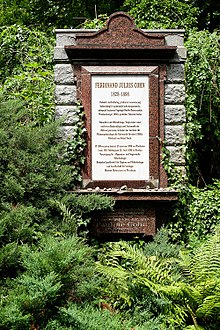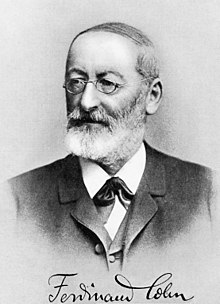Ferdinand Julius Cohn
Ferdinand Julius Cohn (born January 24, 1828 in Breslau ; † June 25, 1898 there ) was a German botanist and microbiologist . Alongside Robert Koch, he is one of the founders of modern bacteriology . Its official botanical author abbreviation is " Cohn ".
Life
Cohn was born in Breslau in 1828 as the son of the oil trader and later consul Isaac Cohn and his wife Amalie, née Nissen. After graduating from high school in 1844 at the Maria Magdalenen grammar school in Breslau, he studied natural sciences (botany) in Breslau. Because of his Jewish origins, he was not allowed to do his doctorate in Breslau, so that he moved to Berlin in 1846, where he was a student of Eilhard Mitscherlich , and where he received his doctorate in 1847. In 1849 he became a member of the Leopoldine-Carolinian Academy and honorary member of the Regensburg Botanical Society . In 1850 he was a private lecturer in Berlin. In 1851 the University of Breslau appointed him as a private lecturer. In 1852 he became a member and in 1856 head of the botanical section of the Silesian Society for Patriotic Culture . Ferdinand Cohn was a member of the Society of German Natural Scientists and Doctors .
In 1859 he completed his habilitation in Breslau and became associate professor and director of the University's Botanical Museum. In 1866 he founded the Plant Physiological Institute.
In 1870 he discovered a thread-like bacterium in drinking water wells. He called his discovery Brunnenfaden or Crenothrix polyspora . His efforts to classify bacteria are now regarded as Cohn's main scientific work.
In 1872 he became a full professor of botany. He devoted himself to the biology of the lower forms of life, especially the bacteria, became a co-founder of microbiology and established the use of sterile culture media. He also rediscovered the botanical garden of Lorenz Scholz von Rosenau in Breslau. In 1895 he became a corresponding member of the Academy of Sciences in Paris and in 1889 of the Prussian Academy of Sciences .
Cohn died in his native city of Breslau in 1898. His grave can still be found today in the old Jewish cemetery there .

Honors
- In 1885, Cohn received the Leeuwenhoek Medal from the Royal Netherlands Academy of Sciences .
- In 1893 he became "socio straniero" of the Accademia Nazionale dei Lincei .
- In 1895 he was awarded the Linnean Medal of the Linnean Society of London .
- In 1897 he was admitted to the Royal Society as a "Foreign Member" .
Carl Christian Mez named a genus of the pineapple family , Deuterocohnia , in Cohn's honor . Since there was already a genus of the lily family called Cohnia at that time , the Greek prefix deúteros (= second) was used to form a new valid name.
For award winners who have made outstanding contributions to microbiology and / or hygiene, the Ferdinand Cohn Medal of the German Society for Hygiene and Microbiology was donated in honor of Ferdinand Cohn .
Works
- On the natural history of Protococcus pluvialis . Bonn, 1851
- Humanity and the flora . Breslau, 1851
- The Household of Plants Leipzig, 1854
- Investigations into the history of the development of microscopic algae and fungi . Bonn, 1853
- Contributions to the biology of plants (series of publications, Breslau, founded in 1870)
- Investigations on bacteria. In: Contributions to the biology of plants. Volume I, No. 2, 1872, pp. 126-224.
- New studies on bacteria . Bonn, 1872–75
- The plant . Leipzig, 1882. ISBN 9783864446085 . Reprint of the original. Salzwasser-Verlag, 2011
literature
- Pauline Cohn: Ferdinand Cohn. Leaves of memory. Compiled by his wife. With contributions by Felix Rosen. Kern, Breslau 1901.
- Wolfgang U. Eckart : History of medicine. 3. Edition. Springer, Berlin / Heidelberg / New York 1998, ISBN 3-540-63756-7 .
- Margot Klemm: Ferdinand Julius Cohn 1828 - 1898. Plant physiologist, microbiologist, founder of bacteriology. Lang, Frankfurt am Main 2003, ISBN 3-631-51643-6 .
- Werner Köhler : Cohn, Ferdinand Julius. In: Werner E. Gerabek , Bernhard D. Haage, Gundolf Keil , Wolfgang Wegner (eds.): Enzyklopädie Medizingeschichte. Walter de Gruyter, Berlin and New York 2005, ISBN 3-11-015714-4 , p. 266 f.
- Till van Rahden : Jews in honor. Ferdinand Julius Cohn, the first Jewish honorary citizen of Wroclaw. In: Till van Rahden: Jews and other Breslauers. Relations between Jews, Protestants and Catholics in a major German city from 1860 to 1925. Vandenhoeck & Ruprecht, Göttingen 2000, ISBN 3-525-35732-X , pp. 300-316.
- Hermann goat bacon : Cohn, Ferdinand Julius. In: New German Biography (NDB). Volume 3, Duncker & Humblot, Berlin 1957, ISBN 3-428-00184-2 , p. 313 f. ( Digitized version ).
- Cohn, Ferdinand Julius , in: Encyclopaedia Judaica , 1972, Volume 5, Col. 689.
- Ferdinand Julius Cohn (1828-1898) microbiologist . In: Ekkehard Vollbach: Poets, Thinkers, Directors. Portraits of German Jews , Leipzig: edition chrismon, ISBN 978-3-96038-243-0 , pp. 53–65.
Web links
- Literature by and about Ferdinand Julius Cohn in the catalog of the German National Library
- Works by and about Ferdinand Julius Cohn in the German Digital Library
- Author entry and list of the described plant names for Ferdinand Julius Cohn at the IPNI
- Ferdinand Cohn, life and work
- Document on the life and work of Cohen at the Pacific Northwest Foundation
Individual evidence
- ^ List of members Leopoldina, Ferdinand Cohn
- ↑ Members of the Society of German Natural Scientists and Doctors 1857
- ^ Members of the previous academies. Ferdinand Julius Cohn. Berlin-Brandenburg Academy of Sciences and Humanities , accessed on March 9, 2015 .
- ^ Entry on Cohn; Ferdinand Julius (1828 - 1898) in the Archives of the Royal Society , London
- ↑ Ferdinand Cohn Medal - German Society for Hygiene and Microbiology eV ( Memento of the original from August 1, 2016 in the Internet Archive ) Info: The archive link was inserted automatically and has not yet been checked. Please check the original and archive link according to the instructions and then remove this notice.
| personal data | |
|---|---|
| SURNAME | Cohn, Ferdinand Julius |
| BRIEF DESCRIPTION | German botanist and bacteriologist |
| DATE OF BIRTH | January 24, 1828 |
| PLACE OF BIRTH | Wroclaw |
| DATE OF DEATH | June 25, 1898 |
| Place of death | Wroclaw |
